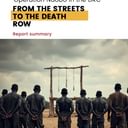
Human rights advocates are criticizing the Singapore government’s plan to execute more death-sentenced prisoners convicted of non-violent drug offenses. Singapore has so far hanged 16 people since resuming state executions in March last year, and all of those executed were low- to mid-level drug offenders convicted of trafficking amounts of drugs that would currently result in relatively small punishments in the UK and US. There is widespread public support for use of the death penalty as an effective policy for reducing drug trafficking in Singapore. In the U.S., one presidential candidate supports a similar proposal to use the death penalty on drug traffickers. International human rights law prohibits use of the death penalty for crimes that are not intentional and “the most serious” crimes that cause lethal consequences.
Laws in Singapore permit the death penalty for people convicted of trafficking more than 15 grams of heroin, 30 grams of cocaine, 250 grams of meth, or 500 grams of cannabis. As of August 9, 2023, there are 50 people currently on death row in Singapore, only three of whom were convicted of murder. The remaining prisoners were convicted of non-violent drug offenses. Since March 2023, most prisoners executed in Singapore were from Indian and Malay minority communities. The Malay community is comprised of indigenous people, most of whom are Muslim, who have historically endured racial discrimination and islamophobia in Singapore. Kirsten Han, a journalist and member of the Transformative Justice Collective, stated, “Most of the death row prisoners whose cases I’ve encountered are on the lower rungs of drug syndicates. Most are ethnic minorities from working class backgrounds. Some are, or were, themselves long-time drug users, and did not receive adequate support to recover.”
In 2022, Singapore was one of six jurisdictions that executed people for non-violent drug offenses, including Iran, China, Saudi Arabia, North Korea and Vietnam. Despite the Singapore’s Central Narcotics Bureau’s aim to exclusively target drug kingpins, Singapore Law and Home Affairs Minister K. Shanmugam admitted that the drug kingpins were not the people who were targeted because they were operating outside of Singapore. Luo Ling Ling, a Singapore attorney who has represented death-sentenced prisoners for 10 years, including some of those recently executed, stated, “In our country there are so many presumptions in drug law. The accused person is presumed to possess drugs for trafficking. That’s not fair because the prosecutor does not have to prove that the person had any intention of trafficking. The prosecution has a very easy job, it gives them an unfair advantage and it makes it so easy to convict people.”
The United Nation’s Office on Drug and Crime issued a statement in 2019 opposing the application of the death penalty for people convicted of non-violent drug offenses. Ajeng Larasati, Human Rights Lead at Harm Reduction International, an NGO which tracks the use of the death penalty for drug crimes, stated, “What we are witnessing in Singapore lays bare many of the long-standing issues with the imposition of the death penalty for drugs, including the disproportionate impact on marginalised people and communities who often experience intersecting vulnerabilities. Year by year, we continue to see more examples of how marginalised groups are cruelly impacted by the application of the death penalty.”
Max Daly, Surge in Executions As Singapore Clears ‘Backlog’ of Death Row Dealers, VICE News, August 9, 2023.
Chris Barrett, ‘Tell us a better solution, we will listen’: Singapore defends spate of executions, The Sydney Morning Herald, September 19, 2022.
Read the United Nation’s Office on Drug and Crime statement here.



